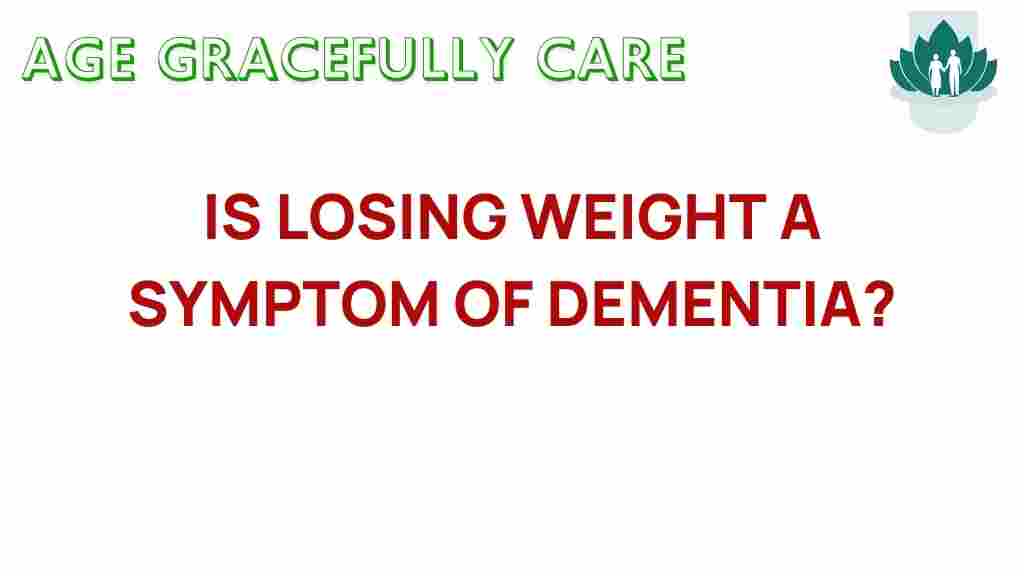Is Weight Loss a Hidden Sign of Dementia?
As we age, our bodies undergo numerous changes, and one of the more concerning issues can be unintentional weight loss. While weight loss may seem like a straightforward health concern, it can sometimes indicate underlying health issues, including dementia. This article aims to unravel the connection between weight loss and dementia, exploring the symptoms, cognitive decline, and the importance of nutrition in elderly care.
Understanding Weight Loss in the Context of Aging
Weight loss in the elderly can be caused by various factors, including:
- Changes in metabolism
- Health issues such as chronic diseases
- Loss of appetite
- Depression and social isolation
- Medication side effects
However, when weight loss occurs alongside cognitive decline, it may raise red flags regarding brain health and potential dementia.
Dementia: A Brief Overview
Dementia is not a single disease but a term that describes a range of symptoms affecting memory, thinking, and social abilities severe enough to interfere with daily life. Common types include:
- Alzheimer’s disease
- Vascular dementia
- Lewy body dementia
- Frontotemporal dementia
Recognizing the symptoms of dementia early can help in managing the condition effectively. Some early symptoms include:
- Memory loss that disrupts daily life
- Challenges in planning or solving problems
- Difficulty completing familiar tasks
- Confusion with time or place
- Changes in mood and personality
Weight Loss and Dementia: The Connection
Research has indicated a significant correlation between weight loss and the progression of dementia. Here’s how they may be linked:
1. Nutritional Deficiencies
As cognitive decline progresses, individuals with dementia may experience difficulties with eating. This can lead to:
- Reduced appetite
- Difficulty swallowing
- Forgetfulness regarding meals
These issues can contribute to significant weight loss and nutritional deficiencies, which can further exacerbate cognitive decline.
2. Changes in Brain Function
Weight loss can be both a cause and a consequence of dementia. The brain requires a consistent supply of nutrients to function optimally. When weight loss occurs, the brain may not receive the necessary nutrients, leading to:
- Increased oxidative stress
- Inflammation
- Accelerated cognitive decline
3. Psychological Factors
Depression and anxiety, common in individuals with dementia, can lead to changes in eating habits and subsequent weight loss. Furthermore, social isolation can make meal preparation and eating more challenging, further impacting nutritional intake and overall health.
4. Medication Effects
Many medications prescribed for dementia symptoms can have side effects that affect appetite. For example:
- Some antipsychotics may lead to weight gain or loss
- Medications for mood stabilization can impact hunger
Monitoring the effects of medications on weight is crucial for elderly care.
Recognizing Symptoms: When to Seek Help
If you notice significant weight loss in a loved one, especially in conjunction with symptoms of cognitive decline, it’s essential to seek professional help. Here are signs to watch for:
- Unexplained weight loss of more than 5% of body weight in a month
- Neglecting personal hygiene or appearance
- Increased forgetfulness or confusion
- Withdrawal from social activities
Step-by-Step Process for Caregivers
Caring for someone experiencing dementia and weight loss can be challenging. Here’s a step-by-step approach:
1. Monitor Dietary Habits
Keep a food diary to track what the individual eats and identify patterns or preferences. This can help in understanding their nutritional intake.
2. Consult a Healthcare Professional
Engage with a doctor or nutritionist to evaluate weight loss causes and develop a tailored nutritional plan.
3. Create a Supportive Eating Environment
Encourage a comfortable and calm atmosphere during meals. This can help reduce anxiety and promote better eating habits.
4. Offer Nutrient-Dense Foods
Emphasize foods rich in nutrients and calories, such as:
- Nuts and seeds
- Avocados
- Whole grains
- Lean proteins
5. Encourage Regular Check-Ups
Regular health assessments can help in monitoring changes in weight and cognitive functions.
Troubleshooting Tips for Caregivers
If you’re struggling to manage weight loss and dementia symptoms, consider the following:
- Experiment with Meal Timing: Some individuals may eat better at specific times of the day. Try to find the times when they are most receptive to eating.
- Incorporate Favorite Foods: Encourage the consumption of foods they enjoy, even if they are not the healthiest options, to ensure caloric intake.
- Stay Hydrated: Dehydration can also lead to weight loss. Ensure they are drinking enough fluids throughout the day.
- Social Eating: Encourage family meals or group dining to create a more enjoyable eating experience.
For more information on caring for individuals with dementia, visit this resource.
Conclusion
In conclusion, weight loss in the elderly, especially when associated with dementia, is a serious concern that should not be overlooked. Understanding the connection between weight loss and cognitive decline is vital for ensuring proper care and intervention. By focusing on nutrition, monitoring symptoms, and seeking professional guidance, caregivers can significantly impact the health and well-being of their loved ones. Remember, maintaining optimal brain health through proper nutrition is essential in the aging process, and every effort counts in supporting our elderly population.
This article is in the category Health and created by AgeGracefullyCare Team
